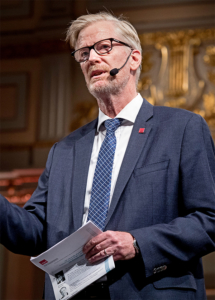“International cooperation is required to solve the world’s severest problems!”
Dan Smith (68) is the Director of the renowned Stockholm International Peace Research Institute (SIPRI) and Professor of Peace and Conflict at the University of Manchester. The native Londoner has been researching conflicts and peace for decades and served in the UN Peacebuilding Fund Advisory Group, which he chaired for two years. Sven Lilienström, founder of Faces of Peace, spoke with Dan Smith about peace, the INF Treaty and climate conflicts.

SIPRI Director Dan Smith | © SIPRI
Mr. Smith, the Faces of Peace initiative aims to highlight existing and future potential conflicts and find diplomatic solutions. What does “peace” mean for you personally?
Dan Smith: Peace is the situation in which it is possible to pursue conflicts and disagreements – between states, between individuals and at every level in between – without damage to those involved in the conflict, to others, or to others’ ability to live in peace with each other.
After the demise of the INF Treaty, the USA has announced that it intends to deploy intermediate-range missiles in the Indo-Pacific region. The Chinese government is responding with threats of its own. How dangerous are the power games with China?
Dan Smith: The difficult US-China relationship holds many risks including the trade war and confrontations at sea as well as a potential arms rivalry.
China was never part of the INF Treaty. As a result, the People’s Republic is now believed to have 2,000 ballistic missiles. Do we need a new treaty that includes the Chinese?
Dan Smith: There are various estimates of how many missiles China has of the ranges covered by the INF Treaty (500-5500 km); the highest estimate is about 1,700, plus a maximum estimate of some 300 cruise missiles. The total includes both nuclear and conventional warheads. In total, China is widely estimate to have about 300 nuclear warheads. The US and Russia have over 6,000 nuclear warheads each.
A new treaty that includes China would be a positive development!
Accordingly, including China in a future arms control treaty would probably exert a downward pressure on US and Russian warhead numbers, as it is hard to see why China would otherwise agree to sign up. A new treaty that includes China would therefore be a positive development. It is, however, unclear whether China will find the proposal of joining a new treaty credible when the old has just been abandoned.
The Strait of Hormuz, a chokepoint for international trade, has become the stage for an international conflict. What do you think of a US-led mission to protect oil tankers in the Persian Gulf?
Dan Smith: Safe passage by sea should be secured by agreement, subject to international law; neither a US-led military mission nor any other military deployment will contribute this aim.
Cyber-attacks, propaganda, and disinformation are means of conducting a hybrid conflict. How vulnerable are Germany, the EU and the NATO countries to becoming targets of hybrid threats and campaigns?
Dan Smith: All European countries are already subject to cyber incidents of various scales from a wide variety of sources. What is called “hybrid warfare” normally also involves the use of armed force; currently, NATO and EU countries face a relatively low risk of experiencing that kind of conflict.
Regarding climate conflicts: The drought in the region around the drying Lake Chad demonstrates the effects of global warming. Is climate change a global security risk?
Dan Smith:
Climate change leads to violent conflict in a context of poor governance.
Climate change leads to violent conflict in a context of poor governance. Unfortunately, many areas that will face the strongest direct impact of global warming lack the structures and capacities in government needed to adapt to it. In these locations there are and will be severe climate-related security risks.
Mr. Smith, our seventh question is always the same: What three trouble spots are in your opinion currently the most dangerous and what measures do you suggest to de-escalate conflict and stabilize peace?
Dan Smith: Northeast Asia, the Gulf, the wider Sahel.
International cooperation is required to solve any and all of the world’s severest problems!
The great need is for dialogue, respect for the rule of international law and a clear recognition that international cooperation is required to solve any and all of the world’s severest problems.